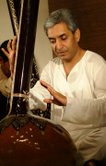Contribute
| Meru Foundation Presents Melodious Hindustani Music By Madhup Mudgal |
Shekhar Shastri
10/17/2007
Melodious Music from a Maestro: Madhup Mudgal to Perform at Harvard on Nov 4. Madhup Mudgal, a leading Hindustani vocalist would be performing at Harvard University on Sunday, Nov 4, 2007. Madhup is the foremost disciple of Pandit Kumar Gandharva, and is known for his melodious voice, original compositions, and classical rigor. I met Madhup Mudgal over twenty years back, when I made the most memorable journey of my life. I was a scientist at Bell Laboratories at that time and was having a great time working with very competent colleagues. Yet something was calling me strongly from within, which in due course led to a prolonged stay in India; a journey into the depths of self-discovery and music. Music had always been there in my life, but the attentive gaze and guidance of a master was magical. It was Pandit Vinay Chandra Maudgalya (Bhaiji) who poured his music and affection into me like I had never known. From sunrise to midnight every moment was about music, and even after two decades, Bhaiji’s blessings continue to illuminate my life. I was a witness to that rigor and privilege. Kumarji had very few students; Madhup would remark that, “Learning from him was a challenge - Kumarji would not enter the room until the student had tuned the tanpura perfectly. You had to bring immense energy and alertness to learn a raaga from him. He would tell you the raaga roopa or raaga anga, but you had to build your own alaap. He would never make you remember the phrases of the raaga, you would have to do it yourself after he told you once. He would give you the raw materials, but you had to build the house yourself, and decorate it yourself. Kumarji was a great teacher of life, not just music." According to Kumarji, the teacher and the Gharana (school of music) could only provide an introduction, and then it was up to the student to improvise, create, and compose according to his own temperament – all the while enriching the classical tradition, not violating it – always with the goal of generating an aesthetic experience. Madhup has developed his singing in an original vein with many influences from many masters of past generations, yet created anew in his melodious voice. During a recent conversation Madhup remarked, “You cannot just pick up a raaga off the shelf. It is necessary to get to know it intimately, nurture it like your child, invite it into your bloodstream, make it your own, and then – you are free to create it in your own way.†This is reflected in the myriad compositions that Madhup has created in many styles for Bharatanatyam and Odissi dancers, elaborate Vedic hymns for choir singing, and numerous original bandish(es) (classical compositions). Besides, he has done classical singing for the Brazilian samba dance, plays the bass and guitar, conducts choirs and loves qawwalis. “I have been listening to many kinds of music since childhood, be it the Beatles, Jazz, or African drums, and somehow they all make home inside me and pour out in some transformed manner into a classical composition from time to time,†he remarked. He started his travels early with the Gandharva choir and performed at the Lincoln Center in New York and Kennedy Center in DC, while he was still in his teens. Since then he has traveled widely and won acclaim from audiences for his singing. He has received several awards, which include the Sanskriti Award and the prestigious Padma Shri from the President of India for his contribution to the field of Hindustani music in 2006. He heads the Gandharva Mahavidyalaya in Delhi, a leading institution for training in music, dance and the arts of India, now training a number of students who are making their mark in the performance arena. Vanita Shastri (781) 862-9648 or vanita@merufoundation.org For directions to the venue please visit the Harvard website: Arthur M. Sackler Museum, Harvard University Shekhar Shastri is an entrepreneur, poet and a filmmaker. He lives in Lexington, MA.
Madhup Mudgal is Bhaiji’s son and the principal of Gandharva Mahavidyalaya, the premier music institution in North India. Madhup or Bhaiyya as we addressed him was a friend and also a teacher. He received his early training in music from his parents and Pandit Vasant Thakar. Gandharva Mahavidyalaya was the nodal point for most classical musicians, frequently visited by a continuous stream of stalwarts such as Pt. Vinayakrao Patvardhan, Pt. Narayanrao Vyas, and Pt. Omkarnath Thakur. By the time he was in high school, Madhup had already absorbed a lot of music, and he would imitate them all with accuracy to the delight of everyone around. It was then that he began his training under Pandit Kumar Gandharva (known to everyone as Kumarji)– the extraordinary musical genius.
He will be performing at the Arthur M. Sackler Museum, Harvard University, on Sunday, November 4th, 2007 at 3pm. The tickets for this event are $20 (General) and $10(Students). This event is free for Harvard University Students and Members of the Harvard University Art Museums with valid IDs. This event is being presented by Meru Education Foundation and co-sponsored by Harvard University Art Museums and Learnquest Academy of Music. For more information, please contact:
You may also access this article through our web-site http://www.lokvani.com/
